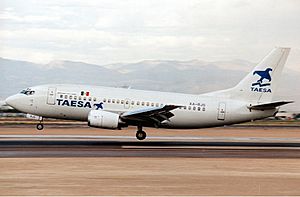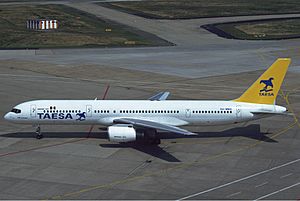TAESA Lineas Aéreas facts for kids
 |
|
| Founded | April 27, 1988 |
|---|---|
| Ceased operations | February 21, 2000 |
| Hubs | Mexico City International Airport |
| Focus cities | |
| Fleet size | 30 |
| Destinations | 40 |
| Headquarters | Mexico City, Mexico |
| Key people | Alberto Abed Schekaiban Carlos Salinas de Gortari |
| Employees | 4,000 (in 1994) |
| Website | taesa.com.mx |
TAESA (which stands for Transportes Aéreos Ejecutivos S.A.) was a Mexican airline. It was known for offering low-cost flights. Its main office was located at Mexico City International Airport in Mexico City, Mexico.
Contents
History of TAESA


TAESA started on April 27, 1988. At first, it flew private planes for business people. In 1989, it got its first Boeing 727-100 aircraft. This allowed TAESA to start flying regular passenger flights.
The airline grew quickly in the early 1990s. In 1991, TAESA became the first Mexican airline to fly the Boeing 757-200. They also added many Boeing 737-300 planes. Soon, they had a variety of Boeing 737 models. TAESA was also the first airline in Latin America to use the Boeing 737-500.
TAESA also carried cargo for companies like DHL. They even leased some of their planes to Garuda Indonesia for flights in Asia. The airline won contracts to fly charter groups, like those from Apple Vacations. By 1992, TAESA was flying many charter trips to Canada, Europe, and the USA. In Mexico, TAESA started a price war, offering cheaper tickets than bigger airlines like Aeroméxico and Mexicana.
In 1995, TAESA launched "crediTAESA." This program let passengers pay for flights in monthly installments. They also started a simple frequent flyer program. It gave travelers a free ticket after five paid flights. Many tickets were sold at booths in shopping malls and supermarkets. At its busiest, TAESA handled 27% of all domestic flights in Mexico.
After Mexico's economy slowed down in 1995, TAESA changed its fleet. They started using older Boeing 727 planes. They also added Douglas DC-9-15s, McDonnell Douglas DC-10-30s, and later Airbus A300B4s.
TAESA was the first Mexican airline to offer regular passenger flights to Japan. They flew there twice a week for four months in 1995.
Towards the end, TAESA faced problems with rules and plane maintenance. After an accident involving Flight 725, their license was suspended. The airline was unable to pay its debts of about $400 million. TAESA declared bankruptcy on February 21, 2000. A deal with other investors, including Continental Airlines, to save the airline did not work out.
Some of TAESA's staff, planes, and routes were taken over by a new airline. This new airline was called Líneas Aéreas Azteca. It started flying in June 2000.
TAESA was one of the first airlines in Mexico to offer low-cost flights. The famous boxing champion Julio César Chávez was one of TAESA's owners. He even advertised the airline on his boxing shorts!
Affiliated Companies
TAESA had connections with these other companies:
- Aviación del Noroeste
- LaTur
- NSW New Southways - This was their cargo division.
- Puebla Air Lines
Places TAESA Flew To
TAESA flew to these cities in Mexico:
- ACA – Acapulco, Guerrero
- AGU – Aguascalientes, Aguascalientes
- BJX – León/Guanajuato, Guanajuato
- CEN – Ciudad Obregón, Sonora
- CUN – Cancun, Quintana Roo
- CUU – Chihuahua, Chihuahua
- CJS – Ciudad Juarez, Chihuahua
- CUL – Culiacan, Sinaloa
- CZM – Cozumel, Quintana Roo
- GDL – Guadalajara, Jalisco
- HMO – Hermosillo, Sonora
- LOM - Lagos de Moreno, Jalisco
- MID – Mérida, Yucatán
- MEX – Mexico City, Distrito Federal
- MTY – Monterrey, Nuevo León
- MLM – Morelia, Michoacan
- PVR – Puerto Vallarta, Jalisco
A*SLW – Saltillo, Coahuila
- TAP – Tapachula, Chiapas
- TIJ – Tijuana, Baja California
- TRC – Torreon, Coahuila
- UPN – Uruapan, Michoacan
- ZCL – Zacatecas, Zacatecas
Airports TAESA served in the United States:
- EGE – Vail/Eagle, CO
- IAD – Washington, VA – Dulles Airport
- JFK – New York, NY – John F. Kennedy International
- LAS – Las Vegas, NV – McCarran Airport
- LAX – Los Angeles, CA – Los Angeles International
- LRD – Laredo, TX
- MIA – Miami, FL – Miami International
- OAK – Oakland, CA
- ORD – Chicago, IL – O’Hare International
Airports TAESA served in Puerto Rico:
- BQN – Aguadilla, Puerto Rico
Airports TAESA served in Japan:
- NRT – Tokyo, Japan – Narita Airport
Airports TAESA served in Germany:
- SXF – Berlin, Germany – Schönefeld Airport
- FRA – Frankfurt, Germany – Rhein – Main International
- CGN – Köln, Germany – Köln Bonn
- DUS – Düsseldorf, Germany
- LEJ – Leipzig, Germany
- MUC – Munich, Germany – Franz – Josef Strauss
TAESA also had agreements to share flights with these airlines:
- Aviación del Noroeste
- Aviacsa
- LaTur
- Puebla Air Lines
- Servicios Aéreos Rutas Oriente
TAESA's Fleet (Planes)
TAESA's planes had only economy class seats. Here are the types of planes they used over the years:
| Aircraft | Total | Introduced | Retired | Notes |
|---|---|---|---|---|
| Airbus A300B4-200 | 2 | 1995 | 1998 | |
| ATR 42-320 | 3 | 1992 | 1996 | |
| Boeing 727-100 | 14 | 1989 | 2000 | |
| Boeing 727-200 | 2 | 1994 | 2000 | |
| Boeing 737-200 | 5 | 1993 | 2000 | |
| Boeing 737-300 | 19 | 1991 | 2000 | |
| Boeing 737-400 | 2 | 1992 | 2000 | |
| Boeing 737-500 | 5 | 1996 | ||
| Boeing 757-200 | 7 | 1991 | 2000 | One plane later became Trump Force One. |
| Boeing 767-300ER | 1 | 1992 | 1995 | Moved to Air Europe |
| Fokker F27 Friendship | 1 | 1993 | ||
| Lockheed JetStar | 1 | Unknown | Unknown | |
| McDonnell Douglas DC-9-14 | 2 | 1995 | 2000 | Leased from Intercontinental de Aviación |
| McDonnell Douglas DC-9-15 | 3 | |||
| McDonnell Douglas DC-9-31 | 1 | 1998 | 1999 | Involved in Flight 725 accident |
| McDonnell Douglas DC-10-30 | 2 | 1995 | 1997 | |
| McDonnell Douglas DC-10-30CF | 1 | 1998 | 2000 | |
| McDonnell Douglas MD-83 | 1 | 1992 | 1992 | Moved to Compass Airlines |
| McDonnell Douglas MD-87 | 2 | 1997 |
Safety and Incidents
TAESA faced some challenges related to safety:
- On June 18, 1994, a small Learjet 25 plane crashed near Dulles International Airport. All 12 people on board died. The investigation found that the pilots made mistakes.
- In April 1997, a McDonnell Douglas DC-10 plane was damaged during a landing in Santo Domingo.
- On November 9, 1999, TAESA Flight 725 crashed shortly after taking off from Uruapan International Airport. The flight was on its way to Mexico City. Sadly, 18 people died in this accident. This event led to many questions about the airline's safety and how it maintained its planes.
After the accident of Flight 725, the Mexican aviation authorities inspected TAESA very closely. The airline was told to fix certain safety issues. However, TAESA was already in a lot of debt and could not continue flying. This led to the airline closing down.
See also
 In Spanish: Transportes Aéreos Ejecutivos para niños
In Spanish: Transportes Aéreos Ejecutivos para niños
- List of defunct airlines of Mexico
 | John T. Biggers |
 | Thomas Blackshear |
 | Mark Bradford |
 | Beverly Buchanan |

